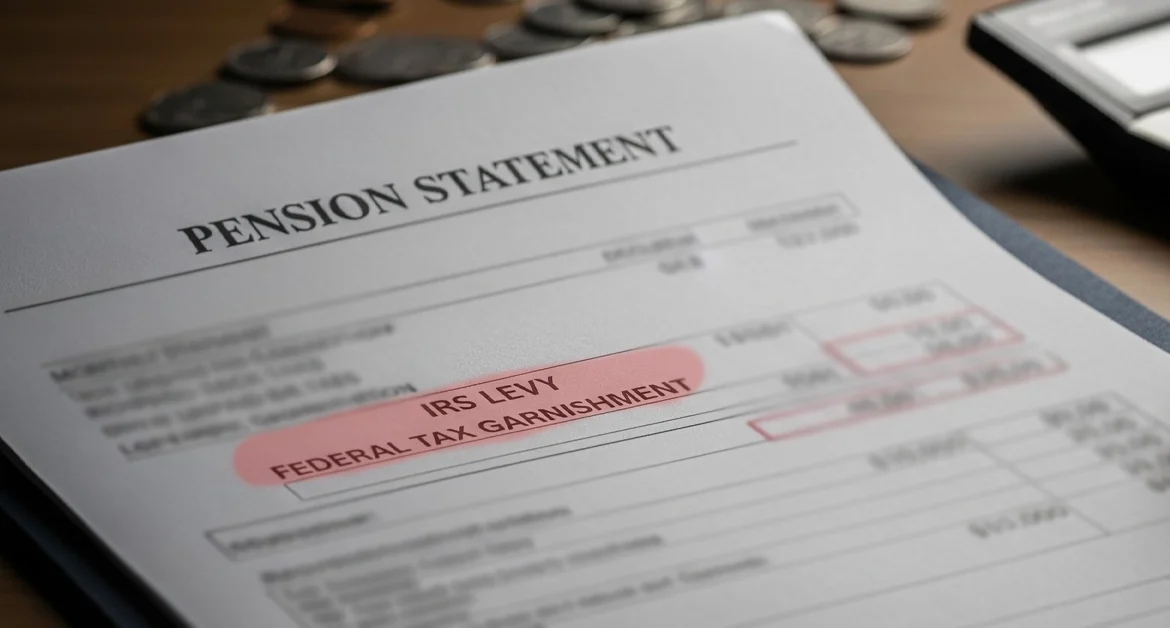The Short Answer: Yes, But With Limits
The IRS does have the power to levy retirement accounts for unpaid taxes.
However, not all retirement income is treated equally. Some accounts can only be reached when distributions are made, while others may be subject to direct levy under strict rules.
That means your pension or retirement savings may be vulnerable, but you still have options to protect them.
How the IRS Treats Pensions and Retirement Funds
Pensions and Annuities
If you receive regular pension or annuity payments, the IRS can issue a levy against those payments, similar to how they garnish wages.
The levy applies to ongoing distributions until the tax debt is satisfied or a resolution is reached.
401(k) Plans
Active 401(k) accounts are more difficult for the IRS to reach. Generally, the IRS cannot force an employer plan distribution before you are eligible (retirement age, separation from service, or hardship provisions).
However, if you are already receiving distributions, those payments can be levied.
IRAs
Individual Retirement Accounts (IRAs) can be levied directly, because you as the account owner have the right to withdraw funds at any time (though early withdrawals may carry penalties).
This makes IRAs more vulnerable than 401(k)s.
What the IRS Considers Before Levying Retirement Accounts
While the IRS has authority, it does not seize retirement funds lightly. Agents are directed to consider:
- Age and financial condition of the taxpayer. Levies are less common when it would cause undue hardship.
- Other collection alternatives available. Installment agreements, offers, or hardship status may be pursued first.
- Public policy. The IRS typically avoids actions that would leave a taxpayer destitute.
Still, ignoring notices and refusing to engage can lead to retirement levies.
Protections and Exceptions
- ERISA Protections: Some employer-sponsored plans have protections under ERISA, but these do not block the IRS from using its federal levy authority.
- Hardship Relief: You may qualify for Currently Not Collectible (CNC) status if seizing retirement funds would prevent you from meeting basic needs.
- Exempt Benefits: As with Social Security, certain disability payments are exempt.
The best safeguard is proactive communication with the IRS before accounts are touched.
How to Stop or Prevent a Levy
If you’re worried about your retirement funds, here are your options:
- Installment Agreement: Arrange structured monthly payments.
- Offer in Compromise: Settle your balance for less than you owe.
- Hardship Relief (CNC): Demonstrate that seizure would cause financial hardship.
- Appeal: Challenge a levy if it was issued in error or if relief applies.
How This Connects to Other IRS Seizures
Retirement accounts are one of several types of property and income that the IRS may target. We’ve already covered other high-stress concerns:
- If you’re worried about losing your home or car, see Can the IRS Take My House or Car if I Owe Back Taxes?.
- If you’re concerned about losing part of your paycheck, read Can the IRS Garnish My Wages or Paycheck?.
- And if you depend on Social Security or disability benefits, don’t miss Can the IRS Garnish My Social Security or Disability Income?.
Together, these guides show the full range of IRS collection powers — and, more importantly, the protections and solutions that can stop them.
Bottom Line
Yes, the IRS can garnish pensions, retirement accounts, and some distributions.
IRAs are especially vulnerable because you can access the funds directly, while 401(k)s and pensions are usually only levied once distributions begin.
The good news: retirement seizures are not the IRS’s first move, and there are ways to protect your savings.
By engaging early with the IRS and exploring payment plans or hardship relief, you can secure your retirement and avoid unnecessary stress.


